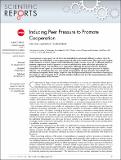Inducing Peer Pressure to Promote Cooperation
Author(s)
Mani, Ankur; Rahwan, Iyad; Pentland, Alex Paul
DownloadMani-2013-Inducing peer pressure.pdf (736.1Kb)
PUBLISHER_CC
Publisher with Creative Commons License
Creative Commons Attribution
Terms of use
Metadata
Show full item recordAbstract
Cooperation in a large society of self-interested individuals is notoriously difficult to achieve when the externality of one individual's action is spread thin and wide on the whole society. This leads to the ‘tragedy of the commons’ in which rational action will ultimately make everyone worse-off. Traditional policies to promote cooperation involve Pigouvian taxation or subsidies that make individuals internalize the externality they incur. We introduce a new approach to achieving global cooperation by localizing externalities to one's peers in a social network, thus leveraging the power of peer-pressure to regulate behavior. The mechanism relies on a joint model of externalities and peer-pressure. Surprisingly, this mechanism can require a lower budget to operate than the Pigouvian mechanism, even when accounting for the social cost of peer pressure. Even when the available budget is very low, the social mechanisms achieve greater improvement in the outcome.
Date issued
2013-04Department
Program in Media Arts and Sciences (Massachusetts Institute of Technology)Journal
Scientific Reports
Publisher
Nature Publishing Group
Citation
Mani, Ankur, Iyad Rahwan, and Alex Pentland. “Inducing Peer Pressure to Promote Cooperation.” Sci. Rep. 3 (April 26, 2013).
Version: Final published version
ISSN
2045-2322